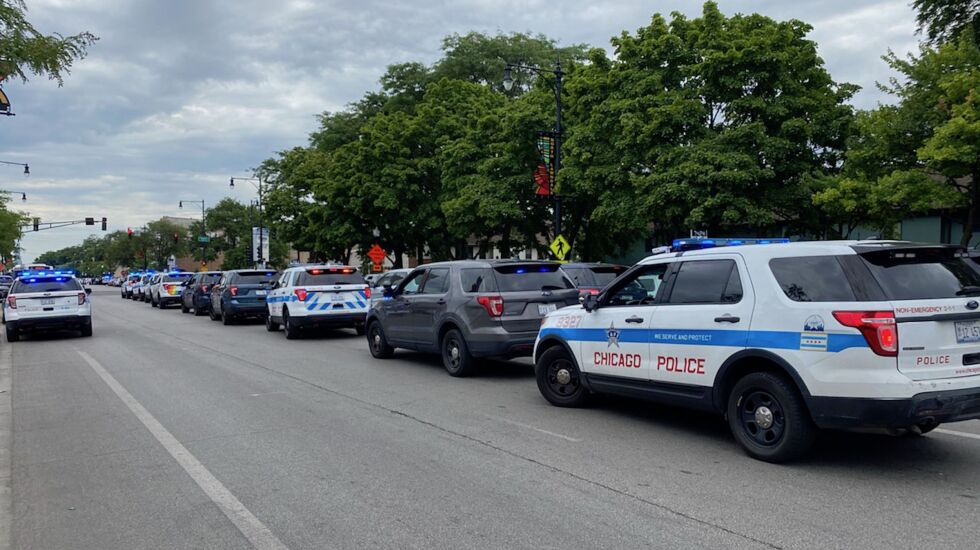
In the last five years alone, 13 Chicago Police Department officers have taken their own lives.
First-responders are more likely to die by suicide than “any other means of death in the line of duty,” according to the U.S. Centers for Disease Control.
The trauma that they see on a daily basis is the “perfect recipe for feeling hopeless,” according to Jennifer McGowan, chief operating officer of the National Alliance on Mental Illness Chicago.
On Thursday, a City Council committee took a small, but important step toward helping their families through the unimaginable trauma — financially, at least.
The City Council’s Finance Committee approved an ordinance that would grant to surviving spouses of police officers and firefighters who have died by suicide since Jan. 1, 2018 the same benefits afforded to families of first-responders killed in the line of duty.
That amounts to one year’s salary, as well as access to a fund that can provide $20,000 to $40,000 for family health care, education and other permitted expenses.
The ordinance was championed by Ald. Matt O’Shea (19th) at the behest of former federal prosecutor Patrick Collins and the two police widows he represented pro bono: Anastasia “Stacy” Escamilla and Julie Troglia.
Their husbands, Paul Escamilla and Jeffrey Troglia, took their own lives. They had 30 years of service between them.
Both widows were listening during Thursday’s virtual hearing. So was Collins.
“Thank you for speaking up. ... We want to take care of this ... to support you during this difficult time — and let you know that we’re thinking of you and we’re thinking of your husbands,” O’Shea said.
In response to questions from Ald. Jason Ervin (28th), Waguespack pegged the cost of the new benefit at $4 million, “if everyone qualified for the maximum benefit.” It’s “in the low tens of thousands, depending on the size of the family” for each household, the chairman said.
The benefit “brings us closer in line to some of the changes in contract, probate and labor and case law acknowledging that death by suicide cannot be disregarded by the law because of a stigma, shame and the challenge of injuries that are not always visible to the eye,” added Waguespack, calling it long overdue.
“It’s time for us to acknowledge that there are some lines of work that put people at greater risk of self-harm through physical and mental trauma.”
Ald. Brian Hopkins (2nd) argued that alderpersons would be “remiss” in passing the ordinance without first pausing for a “moment of reflection” about what’s causing the spike in first-responder suicides.
“People on the front lines see things that we only read about in the newspaper. They experience it. And it has a profound impact on their emotional well-being and their mental health. More and more, it’s manifesting itself in tragedies,” Hopkins said.
“They really are the canaries in the coal mine in a lot of ways. And they’re seeing the gradual degradation of our social order. It should give us all pause about the direction that we’re going as a nation. … It’s tragic that we have come to this point in our society.”
Mayoral challenger Ray Lopez (15th) argued that the suicide surge among first-responders is not simply tied to “what they see” on the job, but “what we are doing to them as the city of Chicago.”
“When we cancel their days off, don’t allow them to de-compress and treat them and speak of them as though they were the enemies of the people, that is what’s driving suicide in our city, more than what they see on the street,” Lopez said.
“Our complete disregard for their service to the city of Chicago is having a devastating and deadly impact on the morale of our police and first-responders. We need to be cognizant of that fact as well.”
Those remarks mirrored the feelings of the two widows.
During a gut-wrenching interview with the Chicago Sun-Times in late April, Troglia talked about the conversation she had with Police Supt. David Brown after her husband’s suicide in March, 2021.
“One of my big pushes was the canceling of the days off. My strong point to that was, these men and women need more than one or two days to fully rest and to have somewhat of a normal life with their family and friends. So they can de-escalate and de-brief and get prepared to go back to the battle of what they have to do every day,” she said then.







